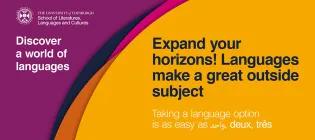French is one of the most widely spoken languages in the world. At Edinburgh, you'll learn about French and Francophone literature, cinema, art, political and philosophical ideas, as well as mastering the language itself.
The University of Edinburgh is unique in Scotland in offering students a full academic year abroad within the four-year honours programme, regardless of whether you spend the year studying or working. If you are studying French with another language, you will divide your time between two countries, broadening your skills and experience.
One of the most attractive characteristics of our degree is its flexibility. As well as lots of joint honours combinations, your first two (pre-honours) years will give you the option to study other subjects drawn from a broad list of disciplines.
On campus and in the city
You will study in the heart of a world-leading festival city filled with cinemas, theatres, galleries, libraries and collections. It has one of the best French collections in the UK in the National Library of Scotland.
There are lots of French-focused activities, societies and clubs in Edinburgh, including the Students' Association's Escogriffes theatre society. We are home to the Centre de Recherches Francophones Belge and have excellent links with the Institut Français d’Ecosse.
Join French and Francophone Studies, and you’ll be part of one of the largest subject areas in a School passionate about languages, literatures and cultures from around the globe.



